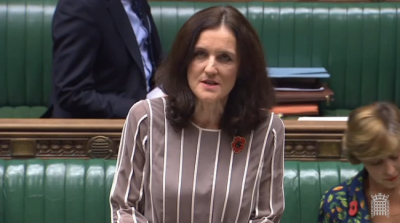Villiers hopes Environment Bill will survive election
Environment Secretary Theresa Villiers expressed her desire to see the Environment Bill continue its passage through Parliament despite the forthcoming general election as she once again faced questions from MPs over the independence of the Office for Environmental Protection (OEP).

The Environment Bill passed its second reading in Parliament on Monday (28 October), following three hours of debate, which saw MPs raise concerns regarding the lack of detail in the Bill.
In particular, MP Sandy Martin, Shadow Minister for Waste and Recycling, criticised the lack of attention to the waste industry, highlighting that there is currently no mechanism in place to deal with the export of plastic waste to countries without the facilities to deal with it.
Martin also criticised the absence of funding to enable local authorities to meet the Bill’s plans for increased recycling rates, as well as a lack of commitment to improving recycling and composting infrastructures.
Although the Bill has now passed its second reading, the upcoming general election on 12 December means that the Bill will now be dropped and will have to be reintroduced in the next Parliament.
When questioned on this, Villiers remained certain that the Bill will be preserved, saying: “This landmark proposed legislation needs to continue regardless of when Parliament dissolves for a general election.
“I think it is vital that this Bill comes back to the house as soon as possible to ensure that we can embed into legislation the important protections that it includes.”
Independence of OEP questioned
Following the Bill’s second reading, MPs from the Environmental Audit Committee (EAC) questioned Villiers on the government’s Environment Bill at a Parliamentary Select Committee yesterday (29 October).
The MPs reiterated their concerns regarding the independence of the OEP – the new environmental watchdog proposed in the Bill, which will replace the oversight and enforcement powers of the European Commission once the UK leaves the EU.
MP Anna McMorrin challenged Villiers for not taking on the EAC’s recommendations to improve the links between the OEP and Parliament.
Remaining adamant that the OEP will be independent, Villiers said: “It will be independent and it will have a multi-year budget. The Secretary of State will have a duty to have regard for the independence of the OEP.
“In terms of appointments, there will be pre-appointment hearings before this committee and the Environment, Food and Rural Affairs (Efra) committee.”
When questioned about the role of the devolved governments in the OEP appointment process, Villiers affirmed that the primary scrutiny process for the appointment of the OEP will lie with the EAC and Efra, and that the devolved administrations will therefore not be involved.
Turning to the Bill’s proposed environmental principles, MP Kerry McCarthy questioned Villiers on why the duty to comply with these principles has not been enshrined in law, but has instead been deferred to a policy statement.
Villiers argued that a policy statement will give the environmental principles greater legislative grounding: “We believe that the greater clarity and more effective approach is to ensure that lawmakers have a clear understanding of their obligations under these principles and the best way to deliver that is through a policy statement.”
When asked when the policy statement will be published, Villers told the Committee that she hopes it will be produced during the course of the Bill’s passage through Parliament.






